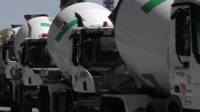Legal
Court Allows Lafarge Case to Continue Over Alleged Islamic State Payments

Lafarge merged with Swiss firm Holcim in 2015, after the alleged payments were made and the cement plant had been abandoned.
Photo by Evelyn Simak (cc-by-sa/2.0)
A French court is allowing a case against major cement and concrete producer Lafarge SA to continue, rejecting the company’s appeal to dismiss charges of complicity in crimes against humanity over accusations it made payments to the Islamic State in Syria.
The May 18 ruling from the Paris Court of Appeals upholds a decision from France’s top court last year which had overturned an early victory for Lafarge in the case.
Advocacy groups Sherpa and the European Center for Constitutional and Human Rights (ECCHR), as well as 11 Syrian former employees of Lafarge, say the company paid as much as 13 million euro—worth about $17.3 million at the time—to armed groups in an attempt to keep a cement plant operating in Jalabiya after fighting broke out in 2011. Those groups allegedly include the Islamic State and others designated as terrorist groups by the U.S. and the European Union.
“This ruling should be a strong wake-up call for companies doing business in conflict zones,” Cannelle Lavite, ECCHR co-director said in a statement. “Companies can no longer justify their involvement in criminal actions with financial reasons. If they enable or fuel crimes—even if they only pursue commercial purposes—they might be complicit and should be held accountable.”
Lafarge merged with the Swiss Holcim Group in 2015, after the alleged payments were made and after the Islamic State reportedly seized the plant. In a statement, Holcim said it strongly disagrees with the court’s decision, and that it plans to appeal the ruling.
“It is important to note that this decision is not a ruling on the merits of the case,” Holcim said. “It is about determining the scope of the charges under investigation.”
As ENR previously reported, Holcim has conducted an internal review of the allegations and said that Lafarge employees decided to make payments to intermediaries for the armed groups after non-Syrian employees left the country.
“We reiterate that the alleged conduct at Lafarge SA is in stark contrast with everything that the group stands for as a company,” Holcim said in its statement. “The events concerning Lafarge SA were concealed from our board at the time of the merger in 2015 and go completely against our values. Lafarge SA continues to cooperate fully with the French authorities in their investigation into the alleged conduct.”
One of the plaintiffs, identified only as Mohammad, said in a statement that Lafarge put him and other former employees in danger “for the sake of profits.”
With the case moving forward, “the message to parent companies is clear: they must protect all employees in their production and value chain, including those of their foreign subsidiaries," said Sandra Cossart, Sherpa executive director, in a statement.
The $640-million Jalabiya plant opened in 2010, ENR previously reported. Starting the next year, it was unable to operate full-time because of the conflict and Lafarge ultimately abandoned it in 2014.






